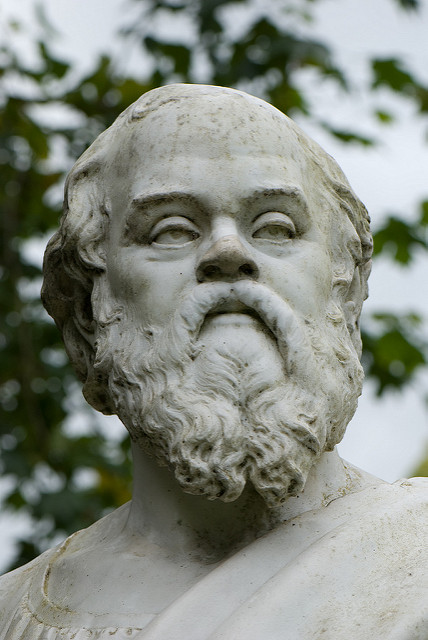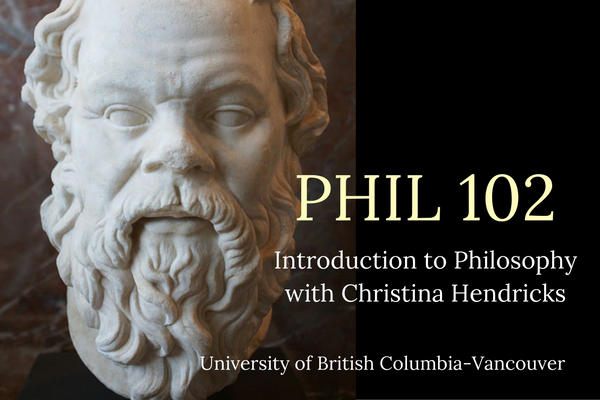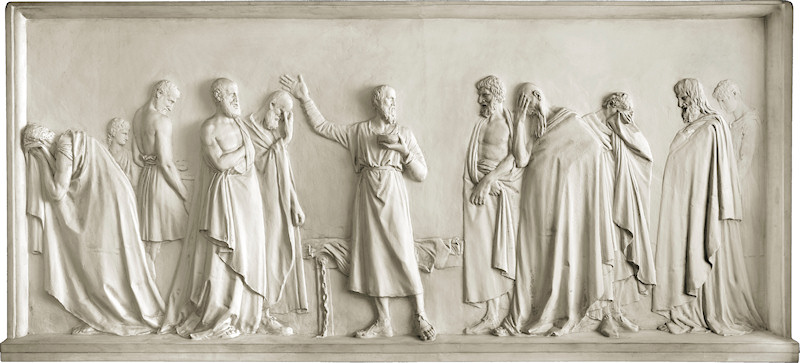For the blended learning course I’m taking on teaching a blended learning course, we were asked to design an “authentic assessment” for one of our courses. An authentic assessment, from what I understand, is one in which students are either simulating or doing the very sorts of activities you hope they will be able to do outside of class, after they take the course. In addition, according to some of the text of the course I’m taking,
According to Eisner (1993), authentic assessment projects should reveal how students go about solving the problems (process) and should have more than one correct solution. They should:
- Promote ‘how’ knowledge as opposed to the ‘what’ knowledge measured in ‘traditional’ assignments;
- Provide a way for students to develop an understanding of complex course material that will serve them beyond the classroom;
- Encourage higher-order cognitive skills;
- Involve students more extensively in the development of the assessment and the grading criteria.
PHIL 102: Introduction to Philosophy
Here is an idea for an authentic assessment activity for my Introduction to Philosophy course.
Rationale
In PHIL 102, Introduction to Philosophy, the main theme of the course is investigating what philosophy is, what philosophers do, and the value of these things, both by reading about what philosophers themselves have said about these questions, and by considering what the philosophers whose texts we are reading are doing with their lives and their writing.
One of the things I’d like students to be able to do by the end of the course is to recognize ways in which they themselves engage in philosophical activity, in their everyday lives.
Activity
Students will write a reflective blog post towards the end of the term in which they discuss two things they do in their lives that could show philosophical thinking or addressing of philosophical questions. They will also add a short summary of their post for a class wiki page on this question.
Learning objective addressed: “Explain at least two ways in which you yourself use philosophical thinking or address philosophical questions in your everyday life.”
Instructions
Now that the course is nearly over, you should have a pretty good idea of what philosophy is and what philosophers do. It’s time to consider the ways in which you yourself engage in philosophy. This assignment consists of two parts:
1. Write a blog post on the class blog in which you do the following:
- Discuss at least two ways in which you yourself use philosophical thinking or consider philosophical questions in your own life, your own day-to-day activities, your major life decisions, etc.
- Explain why these could be considered “philosophical,” referring to at least one of the philosophers or texts or ideas we’ve discussed in class.
- This blog post should be at least 300 words long, but no longer than 800 words
2. After you’ve completed your blog post, contribute your two ways to the class wiki page for this assignment [give URL for this here].
- Write a one or two-sentence summary of each of the ways you engage in philosophical thinking or activity and put them as bullet points on the wiki page.
- Christina will then organize these under general categories after they are posted, to make them easier to read through, and we’ll discuss the results in class
Marking criteria
This assignment will be marked using a three-level system:
1. Plus:
- Your blog post discusses at least two ways in which you engage in philosophical thinking or address philosophical questions in your life
- Your blog post adequately explains how these things are philosophical, referring to at least one of the philosophers/texts/ideas we’ve discussed in class.
- Your blog post is between 300 and 800 words long.
- You wrote a one- or two-sentence summary of each of the two things you discussed in your post, on the class wiki page.
- Both the post and the wiki entry were completed by the due date and time.
2. Minus:
- Your blog post discusses only one way in which you engage in philosophical thinking or address philosophical questions in your life, or
- Your blog post does not adequately explain how this/these activities are philosophical, and/or doesn’t refer to at least one of the philosophers/texts/ideas we’ve discussed in class, or
- Your blog post is less than 300 words or more than 800 words, or
- Your blog post was fine, but you didn’t submit your one- or two-sentence summary of each point discussed in the post on the wiki page, or
- Your blog post and/or wiki entry were submitted after the due date and time, but no later than six days afterwards.
3. Zero:
- Your post and/or wiki page entry was not completed, or
- Your blog post and/or wiki entry were completed seven or more days after the due date.
Thoughts/questions
I wanted this assignment to not only be useful for the students writing the posts themselves, to get them to think about how philosophy plays a role in their own lives, but also to others. That’s why I thought of having them post to a wiki page–there are often over 100 students in this course, and reading that many different blog posts will be too much for anyone else visiting the course (my courses are on open sites, on UBC Blogs, so anyone can visit them; students always have the option of posting under a pseudonym, or with a password so only the rest of the class can read, or private to me if they choose).
But just having a list of one- or two-sentence summaries on a wiki page is too messy too. So I thought I’d try to categorize them myself after they’re posted, and say something like: 15 people said x, 8 people said y, etc.
Of course, this is more work for me. Any ideas on how to make it so that we have a kind of summary document that might be useful for students in the class as well as others, without me having to go through and categorize all the entries? It’s okay if I have to do so (it’s just busy work, and easy), but if there are other ways I’d love to hear them!
PHIL 230: INTRODUCTION TO MORAL THEORY
Here is an idea for an authentic assessment for this course. Students will be writing in a “moral issue” journal throughout the course, starting with what they think about a particular moral issue, then comparing this with what they think each of the philosophers we study would say about it, and then concluding with their thoughts on the value of trying to come up with moral theories such as the ones we’ve studied. For this assignment, I’d like students to be able to take what they’re reflecting on in their moral issue journals and refine part of it into a formal essay.
This way, they’ll be using what they have learned in the course in thinking about moral issues they may face around them in their everyday lives.
Moral issue paper
For this paper, you’ll be using what you’ve reflected on in your moral issue journal and writing a formal paper. The idea here, as with the moral issue journal, is to apply the moral theories we’ve been studying to a moral issue that you might face in your life, or one that involves a larger group of people such as a community or nation. In this way, you’ll be making connections between what we’re studying in class and your life beyond.
Instructions
Using the moral issue you’ve been focusing on in your moral issue journal, write an argumentative paper that argues for how a consequentialist and a Kantian would approach the issue. Include also your own view on whether one approach is better than the other for this particular issue, and why (or why not; it may just be that they are very different and there’s no clear reason to choose one over the other).
Parts of the essay
Note from the Guidelines for essays handout that your essay should have an introduction with your thesis statement, a conclusion that wraps up the essay in some way, and body paragraphs that provide adequate arguments for the conclusion.
Your thesis should include (note that a thesis can be more than one sentence):
- A summary statement of what a consequentialist and a Kantian would say about the issue
- A summary of your view on whether or not one approach is better
Be sure to explain the moral issue you’re addressing, early on in the essay.
Length
The essay should be between 5 and 8 pages, typed, double-spaced, with margins between 0.75 and 1 inches, and font size between 11 and 12 points. [Or 2000-3000 words?]
Quotes, paraphrases, and citing sources
Quotes vs paraphrases: It’s usually best to have a mixture of both. You should use quotes where it’s important to give the author’s exact words, where the words themselves help you to make a point. This is often the case when a passage can be interpreted in more than one way, and you want to justify your interpretation with the words of the author. You can also use quotes where you need an extended passage to make your point (be sure to indent quotes over 4 lines long, 5 spaces on the left).
Citing sources in the paragraphs: Whether you give a quote or paraphrase a specific point from the text, you should give a page number or section/paragraph number to show where the information can be found in the text. You choose your favourite citation style, or you can just give the author’s last name plus the page or section number, in parentheses: (Kant 55). (This is the MLA style.) If you are citing more than one text by an author, give a shortened version of the title of the text in the parentheses as well: (Kant, Religion 99).
Citing sources at the end of the essay: Be sure to give a works cited page that includes all the texts you cited in parentheses in the essay. Again, you can use any citation style you wish, but be sure to include all the information that that citation style requires. For example, you can see how to create a Works Cited list in MLA style here [give URL].
Avoid plagiarism: It is the policy of the Instructor to prosecute plagiarism to the fullest extent allowed by UBC. Any use of another’s words, including just a sentence or part of a sentence, without citation, constitutes plagiarism. Use of another’s ideas without citation does as well. To avoid plagiarism, always give a citation whenever you have taken ideas or direct words from another source. Please see this page on the course website for information on how to avoid plagiarism, especially when you’re paraphrasing ideas or quoting from another source—quite a lot of plagiarism is not on purpose, just because students don’t understand the rules! https://blogs.ubc.ca/phil102/resources/
Depth of explanation and narrowness vs. breadth and superficiality: It’s usually best to focus your paper on a small number of claims and argue for them in some depth rather than trying to range widely over a very large number of claims that you then only have space to justify very quickly. Pick the strongest points for each, consequentialism and Kantianism, and focus on those.
Audience you should write for: Write this essay as if you were writing for someone who is in the class, has not read the texts, and has not attended the class meetings (say, a friend or family member). Explain your view, and the arguments of the philosophers you discuss, in as much depth as would be needed to make them clear to such an audience.
Marking: See the marking rubric posted here on the course website [give URL].
Late penalty: 5 points off per weekday late, unless otherwise agreed to by the Instructor (may require documentation). I do not generally give extensions due to students’ workloads, only for things that are unexpected and unavoidable such as medical issues; so plan ahead if you have multiple assignments due around the time that this essay is due!



